| our_lady_of_good_counsel_-_april_26th.pdf |
|
0 Comments
 St. George was a tribune in the Roman army. One day when he was on his way to join his legion, he came to a city whose inhabitants were in great terror on account of a terrible dragon which lived in a marsh near the walls. This fearful monster had devoured all the flocks and herds; and the people, having retired into the city, gave him daily two sheep until all they had were gone. Then, in order to prevent his approaching the city, they commenced to send out two children to be devoured by this greedy monster. Terrible as this was, it was better than to have him come near them; for his breath poisoned the air for a great distance about him, and all who breathed it died. The children were chosen by lot, and were less than fifteen years old. Now the king had a daughter whom he loved exceedingly. At length the lot fell to her. The king offered all he possessed, even to the half of the kingdom, that she might be spared; but the people said that, as it was his own edict that their children had been sacrificed, there was no reason why his daughter should be spared, and they threatened to take the princess by force if she was not delivered to them. Then the king asked that she might be spared to him eight days longer. This request was granted, and at the end of that time the princess went forth to the sacrifice, clothed in her royal robes and declaring herself ready and willing to die for her people. As she moved slowly toward the field where the dragon came daily for his victims, she saw that the way was strewn with the bones of those who had already perished. Just then St. George came to the place. Seeing her in tears, he stopped to learn the cause of her sorrow. After she had told him, he said, "Fear not, for Iwill deliver thee!" She replied, " 0 noble youth, tarry not here, lest thou perish with me; but fly, I beseech thee!" Then St. George answered, "God forbid that I should fly! I will lift my hand against this loathly thing, and will deliver thee through the power of Jesus Christ!" Even as he spoke, the dragon approached them. Then the princess again entreated him, "Fly , I beseech thee, brave knight, and leave me here to die!" But St. George, making the sign of the cross, rushed to combat with the monster. The struggle was terrible, but at length the dragon was pinned to the earth by the lance of the brave knight. He then bound the dragon with the girdle of the princess; and when he gave it to her, she was able to lead the conquered beast like a dog. In this manner they approached the city. The people were filled with fear; but St. George cried, "Fear nothing; only believe in the God through whose might I have conquered this enemy, and be baptized. Then I will destroy him before your eyes." On that day twenty thousand people were baptized. After this, St. George slew the dragon and cut off his head. The king gave him great treasures; but St. George gave all to the poor, keeping nothing for himself. Then he went on his way toward Palestine. This was the time of the publication of the Edict of Diocletian, which declared the persecution against the Christians. All who read it were filled with terror, but St. George tore it down and trod it into the dust. For this he was carried before the proconsul Dacian, and condemned to eight days' torture. He was first bound to a cross, and his body torn with sharp nails; next he was burned with torches, and then salt was rubbed into his wounds. Seeing that all these horrible cruelties had no power to vanquish the spirit of the Saint, Dacian sent for an enchanter, who invoked the aid of Satan, and then poisoned a cup of wine which St. George drank. Before drinking the wine, however, St. George made the sign of the cross, and the poison had no effect on him. The magician was converted to Christianity by this miracle. St. George was next bound upon a wheel filled with sharp knives, but two angels descended from heaven and broke it into pieces. They then put him into boiling oil. Believing that he must now be subdued, the judges took him to assist at the sacrifices in the heathen temple. Crowds came to witness his humiliation. But the Saint knelt down and prayed, and instantly there came thunder and lightning from heaven. The temple was destroyed; the idols were crushed; while the priests and many of the people perished. At last Dacian commanded the saintly hero to be beheaded. He met death with joy and courage. In Europe St. George was but little honored until the time of the Crusades, when the aid he obtained for Godfrey of Boulogne made Christian soldiers seek his patronage. When Richard I made holy war, he placed his army under the protection of St. George, who from this time has been patron saint of England. His feast was ordered to be kept through all England in 1222. Source: Misericordia Fifth Reader, Imprimatur 1928 Three coloring pictures of Saint George can be found below.
Henri-Marie Boudon, Archdeacon of Evreux, and St. Bernard.
" From henceforth all generations shall call me blessed."— Luke i. 48 Extracts from the saintly Henri-Marie Boudon, Archdeacon of Evreux. See his work on the " Devotion to Our Immaculate Mother.'' THERE is no nation, no state or condition, which has not called Mary "Blessed." Pagans, Greeks, barbarians—the noble, the rich, and the poor— have honored her, have invoked her aid. Angels, men, heaven, and earth have striven to show her their respect and homage. Certainly a devotion must be good, when it is so universal a practice among the faithful; and if St. Augustine makes use of the uniformity and extent of the belief of all Catholic nations as a proof that they must belong to the true Church, it is also an evident proof of the solidity and holiness of devotion to our Blessed Lady to see the universal piety of the faithful. There are millions who daily implore her motherly protection; an innumerable number of zealous voices call upon us to share in their devotion; the Holy Spirit of God encourages men of every condition of life in every nation. We may safely say that heaven resounds with her glory, and the universe re-echoes its praises. All nations who adore God, pay honors to the wonders done to her: Europe, Asia, Africa, America, have all been struck with astonishment at the "great things that He that is mighty hath done to her." It must not be supposed that the devotion to the Blessed Virgin is merely a devotion practised by simple or ignorant people; crowned heads have considered it a great honor to be devoted to her, and to acknowledge her as their Lady and their Queen. The canticle, which says in a general way, "All generations shall call me blessed," does not seek any blind submission to our faith; to believe it does not call for any stretch of imagination; it needs only to be seen. Even at first sight, it is apparent that what the Blessed Virgin foretold has long been accomplished. So many monuments raised to her honor, so many churches consecrated in her name, so many hands busy in writing her praises, so many preachers glad to eulogize her virtues —all these form so many authentic testimonies to the truth of her prophecy. Here you see the happiness of the ever Blessed Virgin universally acknowledged. Oh ! what a consolation it is for me, when I think of the many honors you, my dearest Mother, have received in every part of the world, where the Gospel has been preached, or where your Son is adored ! What a joy it is, when I read of the many sanctuaries that have been consecrated to your honor and glory ! of the many feasts that the Church has set apart for you ! of the many holy fraternities, military orders, and religious communities that honor you with an especial worship and are consecrated to your service ! Since we have spoken of monarchs who have done much to spread the devotion to the Blessed Virgin, do not let us forget that glorious St. Louis the Just, who solemnly consecrated himself, his kingdom, and his subjects to this Queen of Heaven, and who, to give a striking proof of his love for her, placed his crown and sceptre on the altar of Notre-Dame in Paris, and left especial directions that an annual commemoration of this event should be made in all the churches of France on the feast of her glorious Assumption. This his successor, Louis the Great, ratified and confirmed by an additional decree, in which he beseeches every prelate of his kingdom to exhort his people to cherish a fervent love for, and to practice an especial devotion to, the holy Mother of God. The whole Christian world has, throughout all ages, shown its devotion to the Blessed Virgin ; and this devotion has been authorized by a great number of miracles, which are so many illustrious and striking testimonies which God permits, approves, and draws from it His own glory. Not only the holy fathers and doctors, but the whole Church have exerted themselves to pay her due honor and proclaim aloud her praises, and this the Church has always done; whilst, on the other hand, the baneful spirit of heresy has ever tried to cloud the glory of Mary. So many grand and glorious treatises have been written on this subject, that it would be difficult to enumerate the books that have been published respecting this devotion. The holy fathers, and St, Bernard in particular, reply to those who complain of these multitudes of books, that were all men forced to speak or write of this devotion they never could say enough. From this we must come to the conclusion that devotion to the Blessed Virgin is really the devotion of the Church; and this is nevertheless certified by the particular care it takes to honor her, and by the praises it bestows upon her. In fact, its attention is quite pointed in this respect : it not only does honor to her mysteries, and celebrates her feasts with great solemnity, but, as if all these solemnities were not sufficient to satisfy its devotion. it sets apart one day in the week to be consecrated to her memory. But above all, the miracles which God has worked and still works daily, in favor of this devotion, evidently proves that Mary should be honored in every age and by all the faithful, God being unable to work miracles to authorize error or impiety. Besides, when I speak of miracles, I speak of incontestable miracles, supported by an authority which it would be rash to challenge, such as those which are approved by ecclesiastical powers after a careful and strict examination, or those which we gather from the testimony of authors celebrated for their wonderful learning and rare sanctity. Some have been related even in councils, as in the Second Council of Nicea. This sufficiently denotes that it is very useful to speak of them, to write about them, to preach about them, when they are legitimately approved of ; and this the Church has done in general councils. Henri-Marie Boudon. If you follow Mary you will not swerve from the right path; if you pray to her, you will not fall into despair; if she holds you, you will not fall; if she protects you, you need not fear; if she leads you, you will never weary; and if she befriends you, you will be safe. St. Bernard ~ De Aquae Ductu Source: Half Hours With the Saints, Imprimatur 1891 We have added three more printable Children's books to our downloads. They are: "The Friends of Jesus," by A Religious of the Society of Jesus, Imprimatur 1907; "Little Stories of Christ's Passion," by Nita Wagenhouser, Cum permissu superiorum 1941, and "A Child's History of the Apostles," by Roderick MacEachen, Imprimatur 1916. My children especially loved Little Stories of Christ's Passion. I read it over and over again during lent. It's perfect for the younger children. My son kept saying, "Wow, Mom, God is so amazing! I love His miracles." I think the author did very well when writing this at grasping the attention of the children. You can find them here. 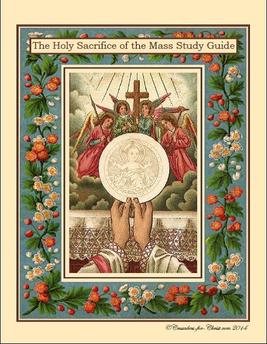 This project started because I wanted my children to understand how important the Holy Sacrifice of the Mass is. It has been a long time consuming project and I hope that it will serve its purpose. My son is loving it! This study guide is a free download that you can find here. All rights reserved - No part of this book may be reproduced except for personal home or school use. ©Crusaders-for-Christ.com In our house handwriting is everyone's favorite subject and my older children asked for more after they completed their course. So I came up with this book, "Handwriting With the Saints." All of the quotes are taken from "The Manual of the Holy Catholic Church". It has an imprimatur of 1906. It is a free download available here. Below you can see a couple samples. I am also working on another handwriting project for my older children. It will be a 4 volume set taken from the "Biblical Treasury of the Catechism." It has an imprimatur of 1899.
From the book itself: This book is divided into thirty-seven lessons, four hundred twenty-one questions, numbered and ordered according to the lessons and questions of the Baltimore Catechism. It is an attempt to put in a comprehensive yet concise form the Scriptural proofs of Catholic doctrine, and is the result of much painstaking research. Through the kind permission of the Bishop of Peoria, the text of the Catechism is introduced without abridgment. The questions and answers of the Catechism appear in bold face type as headings. The passages of Sacred Scripture that confirm the doctrine of the Catechism, or in some way bear upon the question, are placed underneath and are printed in a pleasing “old” type. For the references Arabic figures of “modern style,” made prominent enough to arrest the attention, have been selected. The references are printed in the guise of fractions, and, if read as such, will be easily memorized. The Bible text used in this compilation is that of Potter’s Approved Standard Douay Edition. In itself this book is a thesis proving how ample is the Scriptural basis of Catholic belief. The work is given to the public with the hope that it may be of very great value, not only to Catechumens and Converts and those outside of the fold who desire to see the Scriptural support of the old Faith, but also to all students and teachers of Catholic doctrine especially to Priests, Seminarians and Catechists, who have taken to heart the words of St. Paul: “Carefully study to present thyself approved unto God, a workman that needeth not to be ashamed, rightly handling the word of truth.” One could use it with a religion course from the Baltimore Catechism or on its own as handwriting practice. We hope to have it finished sometime in June, God willing. If any mistakes are found in any of my projects would you please be kind enough to bring it to my attention. Thank you and God bless you all! 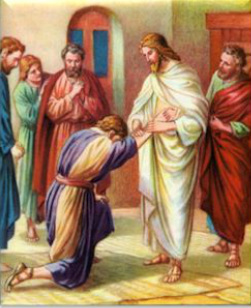 The Apostles were gathered in an upper room, away from interference, for fear of the Jews; there they discussed the events of the last days in the life of their Master, and the appearance He deigned to make to Mary Magdalene. In the evening while they were at supper. Our Lord appeared in the flesh, though the doors were securely locked. The place shone brightly with His presence, and in a reassuring tone He said to them, "Peace be with you!" and showed them the wounds of His hands and feet. The disciples were happy, and again He said to them, "Peace be with you!" My dear young people, you all love peace and are looking for it. Where is it likely to be found? You look for it in most unlikely places; you find strife, deception, and sorrow. Sometimes you look for peace in the enjoyment of pleasures, in the diversions of the world; you deck yourselves with roses; you say, "Let not this opportune time pass by; let us crown ourselves with roses before they fade." But you find no peace; there is always a great vacuum which cannot be filled. The pleasures you have enjoyed have passed too quickly; they have often left a bitter remembrance, and the riches of the world give no contentment. Consider the great and wise Solomon, king of the Jews; according to his own admission, he sought and enjoyed every pleasure; he had a grand throne, great riches, his table was laden with costly food, and he had innumerable servants. There was no kingdom equal to his in splendor and wealth. Of all men Solomon should have been the happiest and yet he was not happy; the more he possessed, the more he was disgusted with the insignificance of these things; he saw in it nothing but vanity and affliction of spirit. Why was Solomon obliged to confess, that amid all his riches, his honors, and his power, he met with no satisfaction, no peace, but felt disappointed? It was this: our hearts are made for God and to enjoy the pleasures of heaven; for that reason the enjoyments of this world can never satisfy us, or give us peace. My dear young people, try to realize this in the beginning of your days. The things of this world look very attractive and promising in our youth, but years will open our eyes to the true state of things. Be not deceived, but begin by giving everything its proper value; love God alone, and that will give you peace, contentment, and happiness. It is certainly a lamentable fact that sin becomes the great source of enjoyment to many of our young people. So blind and wayward are they, that although they know that sin begets nothing hut misery and disgust, they still live on in that sad state. They eat the bread of iniquity and drink the wine of sin. Stronger and stronger grows the fierce fever of passion the more it is indulged, until it can be compared to nothing but a tempestuous, angry sea, threatening with destruction everything that is found in its way. Oh, blessed days of innocence, when you had not tasted the seductive poison of sin! When a little lie, or a disobedience to your parents, gave you terrible disquiet of conscience. In those happy days you sat content at the frugal table, you loved your home and passed the evening in the bosom of your family. Then you had no idea what bitterness of heart or a disquiet mind meant; but there came a time when for the first time you said, "Jesus, I will serve Thee no more." From that moment you felt the stings of conscience. You were like the fratricide Cain, who restlessly wandered about, afraid that every man was his mortal enemy. The rivers threatened to drown him, the hills to fall on him, the valleys to bury him alive. He 'had the dreadful thought in his mind that those who found him would kill him. Would that we could realize the fact that to know God and to love Him is the only source of peace! Thomas a Kempis says, "That God, the eternal and infinite, who fills all things, is the real comfort of the soul and the real joy of the heart." Give testimony to that which you have experienced during these days of the paschal feast. You have made your peace with God by means of a good confession tell me, did you not feel a heavenly joy in your soul when the priest raised his hands to give you absolution? Did you not feel as if new life had been infused into your body and soul? And you, my dear young people, who have had the grace of partaking for the first time of the Bread of angels: did you ever experience such happiness; did you ever feel greater consolation? What a difference there is between serving the good God and serving that cruel monster, the devil! If you have as yet never felt the consolation of serving God, now is the time to make a small effort, and God will reward you with a peace the world cannot give. When the first Napoleon was congratulated on a certain great victory he had gained, and his friends told him it was the most glorious day of his life, he said, "No, the most happy day of my life was the day of my first communion." After Out Lord had twice saluted the Apostles with "Peace be with you,'^ He breathed on them saying, "Receive ye the Holy Ghost: whose sins you shall forgive, they are forgiven; and whose sins you shall retain, they are retained." Impress these words on your memory, for they are the proof of the divine institution of confession. God gave His disciples and their successors the power of forgiving sins. What a great benefit did Our Lord bestow on mankind by this act! He saw that many who had been regenerated by the waters of Baptism would again fall into sin. He gave us this sacrament as a plank thrown to us after shipwreck. You cannot deny, however, that this divine gift is often abused. Some have the temerity to say, "We will commit this sin, and then confess it and it will be forgiven." Never load your souls with such a sin of presumption. Use that great grace for your salvation and not for your damnation. When Our Lord visited the Apostles on this occasion, Thomas was not with them. When he came in they gathered about him, relating the occurrence, "We have seen the Lord," spoken to Him, and touched Him. Thomas answered, "Except I shall see in His hands the print of the nails, and put my finger into the place of the nails, and put my hand into His side, I will not believe." What an exhibition of human weakness! What incredulity, what obstinacy in following out his own views and despising the united testimony of the other ten! What presumption to lay down the law of evidence to Our Lord! Well it was that he had a master so full of love. Eight days afterwards Our Lord appeared again. the doors being shut, and this time Thomas was with them. The Lord had come especially to convince Thomas. Calling him He said, "Put in thy finger hither, and see My hands, and bring hither thy hand, and put it into My side: and be not faithless, but believing." So struck was Thomas by the goodness of the Master, so overcome with sorrow for his fault, that he fell down before Our Lord and cried out, "My Lord and my God." The Lord then said, "Because thou hast seen Me, Thomas, thou hast believed; blessed are they who have not seen and have believed." There are many Thomases among us Christians, and even more incredulous than Thomas, who say, "Unless I see I will not believe." For example they do not understand certain doctrines of the Church; they deny them and are half infidels. A day will come, and perhaps it is not far distant, when they will have to acknowledge the truth of those doctrines; and severe punishments will be dealt out to them for their wickedness and impiety; they are so unbelieving, that if Christ were to appear again before them, they would maintain that it was not He. My dear young people, do not choose such as these for your companions; avoid the conversation of those who do not respect religion; be careful of the books you read. The writings of out present day are full of infidelity. The best Protestant and infidel writers make most ridiculous charges against the holy faith. Doubts are raised concerning fasts; modem scientific discoveries are so distorted that they must needs throw discredit on religion. The young are especially entrapped by this apparent show of reason. Avoid such books, that you may not be affected by their teachings. You must not say that you ought to know the objections to our religion. If you study enough, and can refute them, well and good; but if your knowledge is insufficient you will lose your faith. St. Aloysius Gonzaga, when a child, had a certain book and tried to find out what it was. He could decipher enough to see that it was against religion, so he threw it into the fire and ran to wash his hands, because they had touched such a blasphemous work. In matters of faith, drive away with great care every temptation; renew every day your promises of fidelity; tell God that with His grace you will be His constant follower and ask Him to enlighten and strengthen your faith. You may be sure that there is a great foundation of truth in your religion; that good and wise men have taught and believed it, such as St. Jerome, St. Ambrose, St. Augustine, St. Thomas Aquinas, and many others who have been the glory of the Catholic Church. Blessed is he that shall have preserved his faith, for it is a precious gift. One day you will see the truths plainly revealed, though now some things may strike you as not in accordance with what the world believes. You will be glad at the hour of your death, when you will have the consolation to be comforted by that religion which you have professed in your lifetime. "Blessed are they that have not seen, and have believed." Source: Sermons for Children's Masses, Imprimatur 1900 |
Holy Mother Church
dedicates the month of July to the Most Precious Blood of Jesus COPYRIGHT
The purpose of this website is to share the beautiful Catholic resources that God has so richly blessed us with. All texts unless they are my own words have their sources quoted, and most of them are in the public domain. Any educational items that I have made for or with my children are NOT TO BE USED FOR PROFIT, but are meant to be used for personal use by individuals and families. You may link to our site if you so choose. A Saint for everyday and good reading at:
Archives
July 2024
|
|||||||||||||||||||||
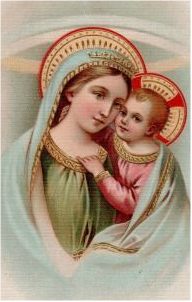
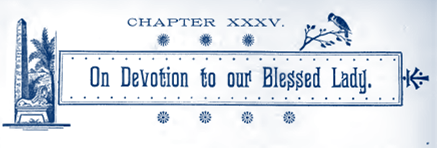

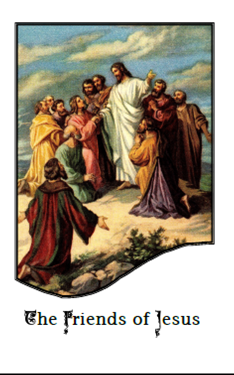
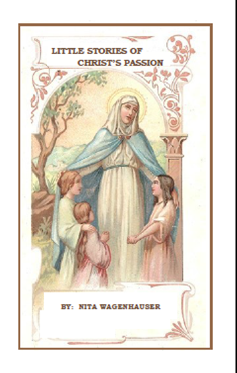
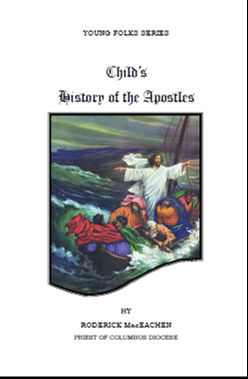
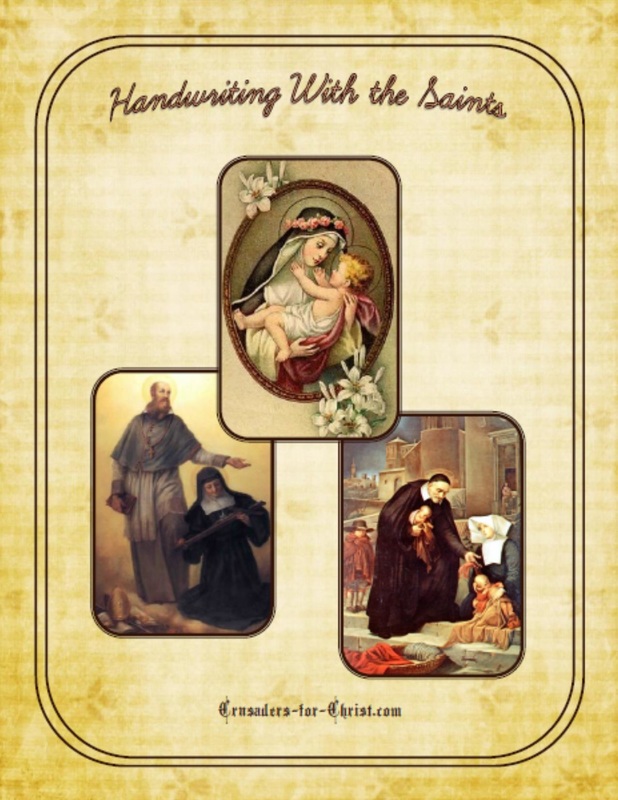
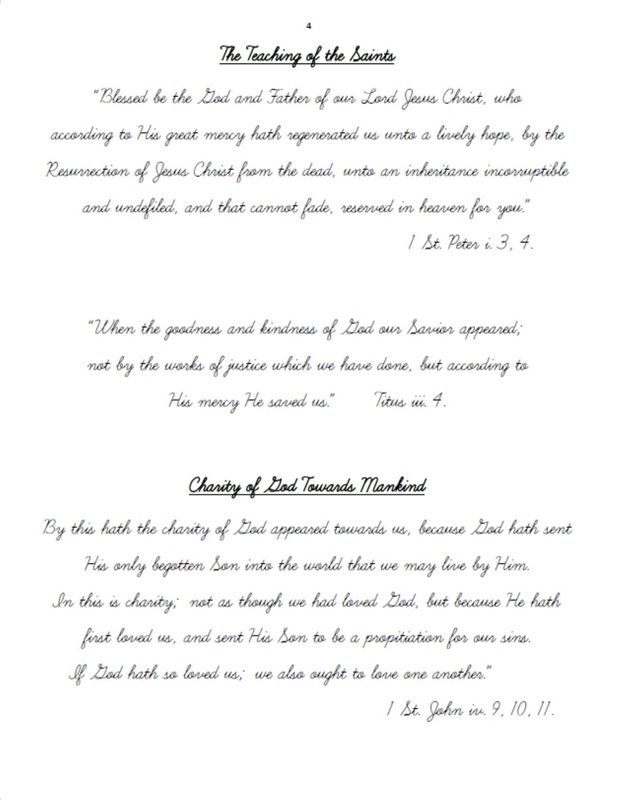
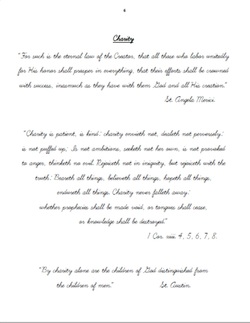


 RSS Feed
RSS Feed